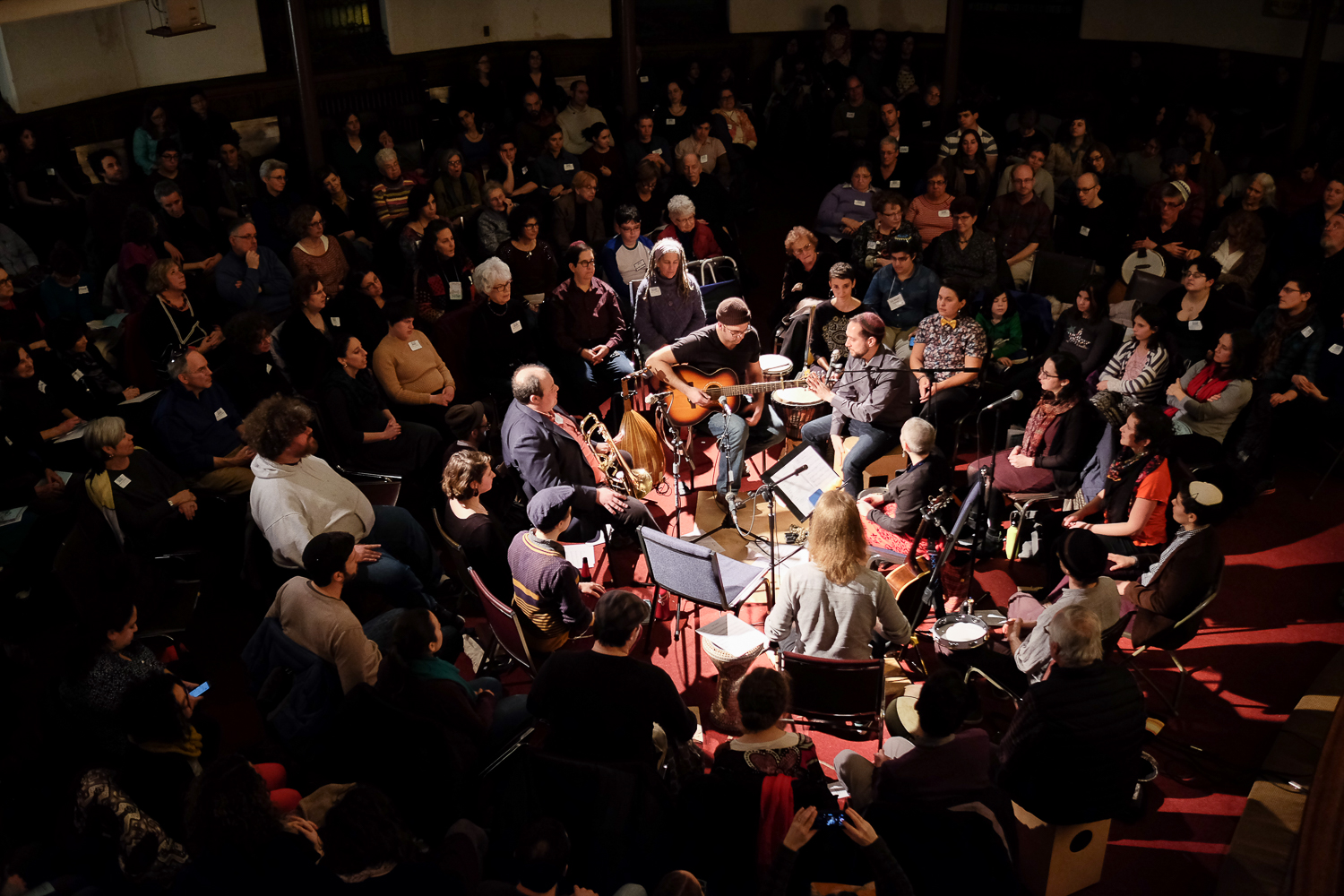
How Singing (Yes, Singing!) Can Create Radical Jewish Accessibility
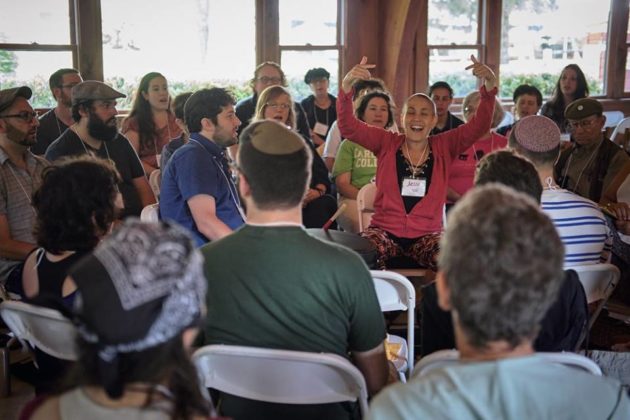 Five years ago, five friends ––Margot Seigle, Batya Levine, Ilana Lerman, Noam Lerman, and myself–– came together to run a weekend-long retreat dedicated to sharing and singing Jewish music, called Let My People Sing! (LMPS). The project began as an experiment. We imagined that fifty people might join us. Instead, 150 people signed up that first summer, and gathered in the woods of Connecticut to sing. We sang in Hebrew, Ladino, Yiddish, Arabic, Aramaic, English, Spanish— wherever Jews have dwelled in diaspora, we sang, and together in community we shared all that we knew from these lineages.
Five years ago, five friends ––Margot Seigle, Batya Levine, Ilana Lerman, Noam Lerman, and myself–– came together to run a weekend-long retreat dedicated to sharing and singing Jewish music, called Let My People Sing! (LMPS). The project began as an experiment. We imagined that fifty people might join us. Instead, 150 people signed up that first summer, and gathered in the woods of Connecticut to sing. We sang in Hebrew, Ladino, Yiddish, Arabic, Aramaic, English, Spanish— wherever Jews have dwelled in diaspora, we sang, and together in community we shared all that we knew from these lineages.
These days, about 250 people join us every summer at the Isabella Freedman Jewish Retreat Center for a weekend of song. I’m no longer surprised that the interest has bloomed beyond what we had imagined. Music is medicine. Music has the ability to free and heal the soul. Of course, this belief is in no way unique to LMPS, and is in fact our shared cultural inheritance, from thousands of years of Jewish singing traditions. But because so many of us have lost access to these traditions, we created LMPS as a place where people could reclaim them.
At LMPS, everyone can be a leader and a learner of song. We start from the assumption that building community should be an intergenerational and radically inclusive project, one that thrives through our differences, including religious and political. At the retreat we create a temporary intentional community, learning from our mentors in the art of transformative experiences (including SVARA, Adamah & TEVA, the Rising Song Institute, and Kol Zimrah). We aim to foster a culture of love, so that participants feel safe and encouraged to take risks, develop new skills, and try out new forms of leadership. Our vision is for more kinds of people to learn how to embody and lead Jewish music and tradition, transforming us individually and transforming Judaism as a whole.
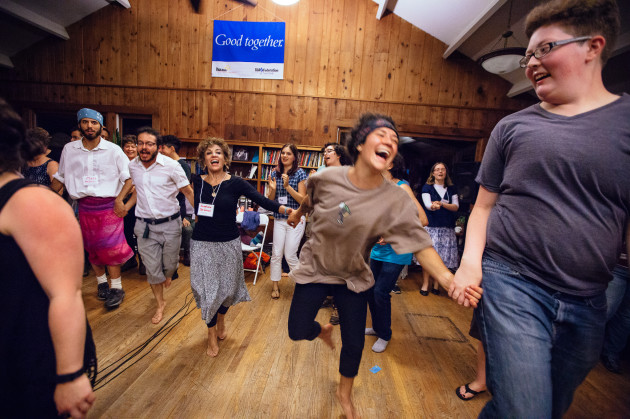 On Shabbat afternoon during the retreat, one can wander around and hear the floating music of many song circles at once: Baghdadi-Indian Melodies of Shabbat; Songs for All Sorts of Survivors; Yiddish Songs About Moshiach; Syrian Piyyutim; How to Engage Children in Song–– just to sample a handful among the 200 workshops we’ve had since LMPS began. Many of us long to restore broken lineages of cultural transmission, hungering to sing the music of our ancestors lost to us through centuries of migration, persecution, and assimilation. We also celebrate and sing original songs created by Jewish artists and cultural activists today.
On Shabbat afternoon during the retreat, one can wander around and hear the floating music of many song circles at once: Baghdadi-Indian Melodies of Shabbat; Songs for All Sorts of Survivors; Yiddish Songs About Moshiach; Syrian Piyyutim; How to Engage Children in Song–– just to sample a handful among the 200 workshops we’ve had since LMPS began. Many of us long to restore broken lineages of cultural transmission, hungering to sing the music of our ancestors lost to us through centuries of migration, persecution, and assimilation. We also celebrate and sing original songs created by Jewish artists and cultural activists today.
At the center of our community are the voices of people who have been, and are still, marginalized in the Jewish community, even erased from normative Jewish practice in the US. This includes, but is not limited to, Queer Jews, Sephardi and Mizrahi Jews, Jews of Color, Transgender Jews, Jews with disabilities, and Jewish women and femmes. Folks who don’t carry these identities and life experiences are also at our retreats, singing and teaching and learning. But we know that most Jewish institutional spaces are not designed with marginalized people at the center, so we strive (and keep striving) for this to be a different kind of space, one that models what is possible when we rewrite the script about who Jews are, resisting white supremacy by reclaiming the many lineages of Jewish culture and sound. 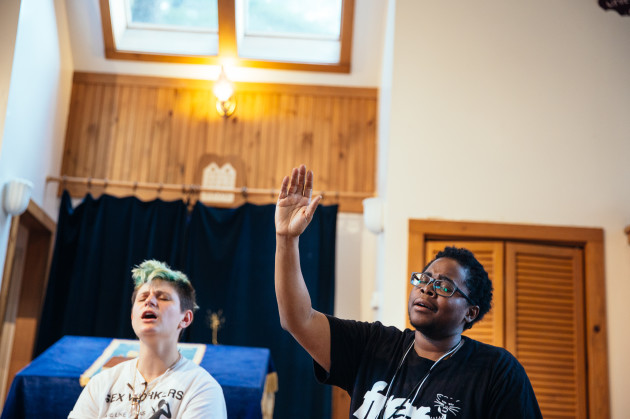
This approach sees teaching songs as a political act. At our retreats we assume that everyone in the room holds different pieces of the Jewish tradition, and that we need one another in order to make it whole. Teaching songs, and cultivating a culture of sharing music, is a way of leveling the playing field. It’s also a feminist act, inverting the patriarchal hierarchies which have instilled the idea that one simply should know something, or that if you don’t know it, there’s something wrong with your Jewishness. Many of us have to unlearn the messages we’ve received that our voices cannot be trusted, that they’re not beautiful, that they’re not Jewish enough or knowledgeable enough or high or deep enough. We learn to respect and trust our own voices, and transform our ability to lead others in the same pursuit. Singing in community encourages us to listen to one another, to blend our voices, to build something collaborative. It fosters in us a sense of interdependence, and orients us toward larger movements for justice, change, and wholeness.
We’ve witnessed many people emerge from LMPS and bring music to movement work and Jewish organizations, to synagogues and havurot, to interfaith coalitions, even to progressive electoral campaigns. We’ve seen large groups of people in the streets singing songs learned at the LMPS retreat or transmitted through our Soundcloud playlists and songbooks. One of our participants described how when she came to LMPS, she sang partisan songs for the first time, and was able to connect more deeply to her activism, realizing that song had also been a part of her grandfather’s antifascist resistance work. Like her, I also experience LMPS as a space to listen for the lost voices of my spiritual ancestors.
When I think about the story of the shepherd, I think about what a great workshop he’d lead at LMPS. He’d teach us how to pray with wonder and depth, calling out the letters as a spiritual practice. And he would be encouraged and supported as he did so, by hundreds of people of all generations and life experiences, whose voices would join his in song. It wouldn’t just be him and God alone on that hilltop anymore. Instead, his whole community would be up there with him, reaching for a world in which someone like him is a leader, a world in which we need one another in order to piece the letters together.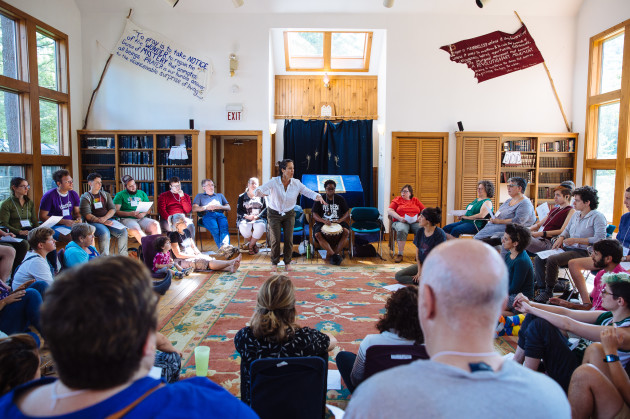
Rabbi Mónica Gomery is one of the five founder-organizers of Let My People Sing! She serves as the Associate Director of National Learning at SVARA: A Traditionally Radical Yeshiva, and as the Music Director of Kol Tzedek Synagogue in Philadelphia.
One comment on “How Singing (Yes, Singing!) Can Create Radical Jewish Accessibility”
Comments are closed.




Enjoyed reading this article very much. Thanks.